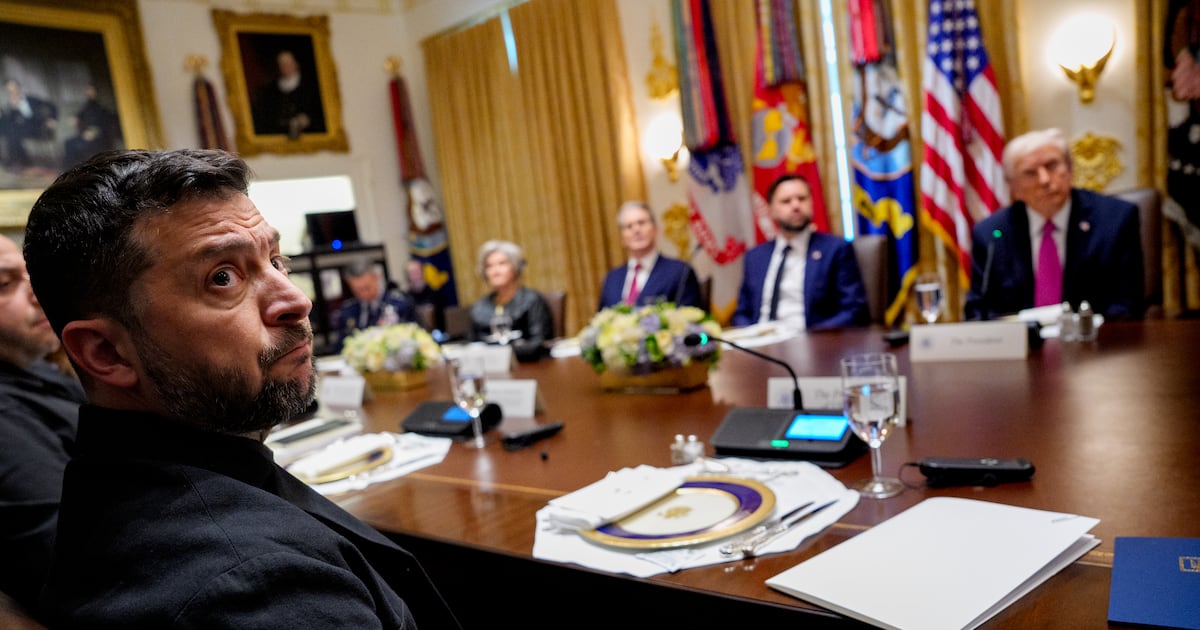World
European Leaders Rally for Ukraine After Trump’s Tense Meeting

European governments have swiftly united in support of Ukrainian President Volodymyr Zelenskiy, following a tense meeting with Donald Trump where the former U.S. president pressured Zelenskiy to consider Russian demands for ending the war. The discussions have ignited urgency among EU leaders to finalize a plan regarding the use of Russia’s frozen assets, which could play a crucial role in providing financial assistance to Ukraine.
On March 18, Kaja Kallas, the EU’s foreign affairs chief, stated, “We see President Trump’s efforts to bring peace to Ukraine; all these efforts are welcome, but we don’t see Russia wanting peace.” Kallas’ comments came after a report by the Financial Times revealed that during the meeting, Zelenskiy attempted to counter Russian President Vladimir Putin‘s demands, which include significant territorial concessions. Trump cautioned Zelenskiy that Putin had threatened to “destroy” Ukraine if it did not comply, suggesting that a peace deal might be attainable when the U.S. and Russian leaders convene in Budapest in the coming weeks.
During a press briefing, Trump emphasized the stakes involved, saying, “If we make a deal, that’s great. If we don’t make a deal… a lot of people are going to be paying a big price.” This remark underscores the delicate balance of power in negotiations that could determine Ukraine’s future.
EU Leaders Plan Summit to Discuss Financial Aid
European leaders are set to gather for a summit in Brussels on March 23, where they aim to agree on leveraging immobilised Russian assets to facilitate a loan of approximately €140 billion to Ukraine. German Chancellor Friedrich Merz has proposed that these funds be used specifically to bolster Ukraine’s military capabilities.
In Luxembourg, EU foreign ministers expressed their commitment to Ukraine, advocating for the use of frozen Russian assets and the introduction of additional sanctions against Moscow. Dutch Foreign Minister David van Weel remarked, “The EU should put Ukraine in a strong starting position by providing military assistance and looking at how we can use the financial assets to give them some kind of financial alleviation.”
EU officials anticipate that the upcoming summit will empower the European Commission to propose a structured loan to Ukraine, enabling the purchase of military equipment. Notably, Hungarian Prime Minister Viktor Orban will not attend the initial discussions due to a national holiday, allowing other leaders to potentially reach consensus without his opposition.
Challenges and Legal Concerns Over Frozen Assets
While support for Ukraine remains strong among EU nations, concerns linger regarding the legal implications of utilizing frozen Russian assets. Belgium, which holds a significant portion of these assets at the Euroclear central depository, has stated it will not approve their use without assurances that other member states will cover costs if Moscow challenges the decision legally.
The Kremlin has vehemently condemned proposals to use frozen Russian assets for Ukraine, branding it “the unlawful seizure of Russian property” and threatening legal action in response. Additionally, EU governments face divisions over the next round of sanctions against Russia, including a proposed ban on Russian liquefied natural gas starting January 2024. Slovakia has indicated it will not support the ban until it receives further concessions, while the rest of the EU has agreed on a complete phase-out of Russian gas by 2028.
EU Energy Commissioner Dan Jørgensen emphasized that this ban would enhance the EU’s energy independence and support Ukraine. Nevertheless, Slovakian Prime Minister Robert Fico has maintained that his government will not withdraw its veto until the EU delivers measures to reduce energy costs and support the struggling automotive industry.
In parallel, Western leaders from the “coalition of the willing” are scheduled to hold discussions with Zelenskiy on March 21 regarding additional military support. Following Trump’s recent refusal to provide Ukraine with Tomahawk long-range missiles, Zelenskiy expressed hope for increased assistance from European allies, noting that “such weapons aren’t held only by the United States.”
Zelenskiy remarked that he has kept European leaders informed about his discussions with Trump, stating, “They want to address him with such requests themselves. We remain in constant coordination.” Trump, reflecting on the ongoing conflict, said, “It’s turned out to be nasty because you have two leaders that truly hate each other… you can’t have it all.”
As tensions continue and diplomatic efforts intensify, the outcome of these discussions will play a pivotal role in shaping the future of Ukraine and its relations with both the U.S. and European nations.
-

 Top Stories2 months ago
Top Stories2 months agoTributes Surge for 9-Year-Old Leon Briody After Cancer Battle
-

 Entertainment4 months ago
Entertainment4 months agoAimee Osbourne Joins Family for Emotional Tribute to Ozzy
-

 Politics4 months ago
Politics4 months agoDanny Healy-Rae Considers Complaint After Altercation with Garda
-

 Top Stories3 months ago
Top Stories3 months agoIreland Enjoys Summer Heat as Hurricane Erin Approaches Atlantic
-

 World4 months ago
World4 months agoHawaii Commemorates 80 Years Since Hiroshima Bombing with Ceremony
-

 Top Stories2 months ago
Top Stories2 months agoNewcastle West Woman Patricia Foley Found Safe After Urgent Search
-

 Top Stories4 months ago
Top Stories4 months agoFianna Fáil TDs Urgently Consider Maire Geoghegan-Quinn for Presidency
-

 World4 months ago
World4 months agoCouple Convicted of Murdering Two-Year-Old Grandson in Wales
-

 World4 months ago
World4 months agoGaza Aid Distribution Tragedy: 20 Killed Amid Ongoing Violence
-

 World4 months ago
World4 months agoAristocrat Constance Marten and Partner Convicted of Infant Murder
-

 Top Stories4 months ago
Top Stories4 months agoClimbing Errigal: A Must-Do Summer Adventure in Donegal
-

 Top Stories4 months ago
Top Stories4 months agoHike Donegal’s Errigal Mountain NOW for Unforgettable Summer Views









